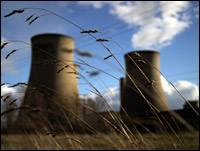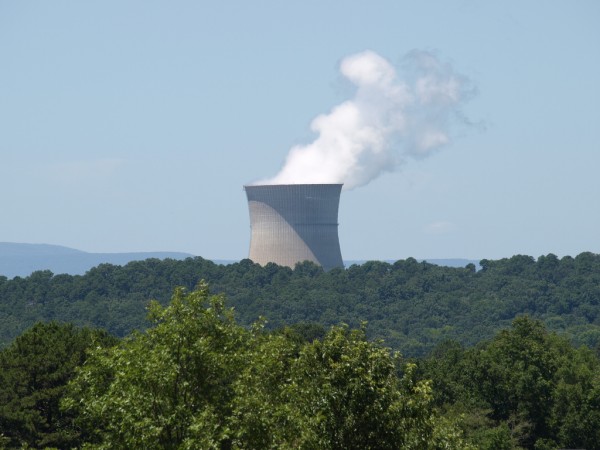 Power companies pursuing construction of new nuclear plants may find it harder to get credit — meaning ratepayers could end up shouldering a greater financial burden for the costly and environmentally harmful projects.
Power companies pursuing construction of new nuclear plants may find it harder to get credit — meaning ratepayers could end up shouldering a greater financial burden for the costly and environmentally harmful projects.
Moody’s Investors Service, a leading independent credit rating firm, recently released a report that says it’s considering taking a “more negative view” of debt obligations issued by companies seeking to build new nuclear plants.
Titled “New Nuclear Generation: Ratings Pressure Increasing,” the report raises concerns that investing in new nuclear plants involves significant risks and huge capital costs at a time when national energy policy is uncertain. Yet companies investing in new nuclear projects — cost estimates for which are hovering in the $6 billion range — haven’t adjusted their finances accordingly, according to Moody’s:
Few, if any, of the issuers aspiring to build new nuclear power have meaningfully strengthened their balance sheets, and for several companies, key financial credit ratios have actually declined. Moreover, recent broad market turmoil calls into question whether new liquidity is even available to support such capital-intensive projects.
Fourteen companies have submitted applications to the U.S. Nuclear Regulatory Commission to build 17 new reactors, with the first approvals expected beginning in 2011. Pursuing new nuclear generation increases a company’s business and operating risk profile, which in turn puts pressure on credit ratings. While Moody’s is optimistic that utility regulators will authorize recovery of costs, that ultimately means higher bills for ratepayers.
Indeed, the report warned of potential “future rate shock” for electricity customers. It also says that proposed federal loan guarantees for nuclear plant construction would “only modestly mitigate increasing risks.”
Moody’s distinguishes between new reactors located adjacent to existing units and brand-new projects, with the former benefiting from existing infrastructure. But the ratings service still views new nuclear plants as what it calls “bet-the-farm” endeavors, making it more likely that the projects will lead to ratings downgrades, as happened during the last round of plant construction in the 1970s and 1980s.
A step above junk
Of the 17 proposed reactor projects on Moody’s list, two already have obligations rated speculative or “junk” grade, and both are in Texas: NRG Energy’s South Texas Project in Bay City, which is rated Ba3 (“questionable credit quality”), and Energy Future Holdings’ Comanche Peak in Somervell County, rated B3 (“generally poor credit quality”). For details about Moody’s ratings, click here.
Thirteen other proposed nuclear construction projects have credit ratings between Baa1 and Baa3 — one step above junk status. They include eight in the South: Dominion’s North Anna in Louisa County, Va.; Duke Energy’s William S. Lee in Cherokee County, S.C.; Entergy’s Grand Gulf in Port Gibson, Miss. and River Bend in St. Francisville, La.; Exelon’s proposed two-unit plant in Victoria County, Texas; Progress Energy’s plant in Levy County, Fla. and its Shearon Harris plant in Wake County, N.C.; and SCANA’s Virgil C. Summer plant in Fairfield County, S.C.
The financing problems have already caused some companies to back away from nuclear projects. Earlier this month, AmerenUE announced that it was suspending plans to build a new reactor at its Callaway plant in Missouri. A factor was that state’s ban of “Construction Work in Progress,” a financing scheme that allows a nuclear utility to recover the construction costs of a reactor from ratepayers before the reactor is up and running.
Earlier this year, Georgia passed a law embracing CWIP. Perhaps not so coincidentally, one of only two nuclear projects that Moody’s report deemed investment-worthy was the Southern Co.’s planned reactor at Plant Vogtle in Burke County, Ga., which netted an upper-medium grade A3 rating. The report’s top rating for a nuclear project — Aaa or highest quality — went to the Tennessee Valley Authority’s proposal for two new reactors at its Bellefonte plant in Hollywood, Ala. TVA also wants to finish two partially completed units at the Bellefonte site that were canceled in the late 1980s after a $6 billion investment.
Moody’s notes that new nuclear power construction “appears to enjoy strong political and regulatory support in a number of jurisdictions, especially in the southeastern states, where there is now legislation afoot to promote it.”
Demanding divestment
The nuclear industry has been critical of Moody’s report, with a Nuclear Energy Institute spokesperson telling the Charlotte Business Journal that it’s based on old information.
But the report has already gotten the attention of anti-nuclear activists. The North Carolina Waste Awareness and Reduction Network sent a letter [pdf] to State Treasurer Janet Cowell citing the report and asking her to ensure state investment funds exclude the bonds issued by Duke Energy and Progress Energy, since North Carolina law requires all debt holdings to be in top-rated securities.
NC WARN recently appealed to the NRC [pdf] to stop the planned construction of two new reactors at Progress Energy’s Shearon Harris plant, noting that the lack of a finalized design makes it impossible to accurately calculate costs.
The financial risks of nuclear power are not the watchdog group’s only concern: NC WARN also points out that Duke Energy recently filed for an 18% rate increase in part to cover construction costs at its controversial new Cliffside coal-fired power plant in western North Carolina:
Although Duke has stated that it is financing Cliffside “from its balance sheet,” utilities regularly borrow and roll various forms of debt; early this year, a bond sale attempted by Duke was “panned by investors,” and the company had to repackage the offering, apparently with higher interest rates.
NC WARN recently asked the state Utilities Commission [pdf] to halt construction at Cliffside, citing the project’s financial risks. Though the Moody’s report focuses solely on nuclear generation, lenders have also warned about the increasing financial risks of coal plants given the uncertain regulatory environment. The commission has not yet ruled on NC WARN’s motion.
“We really need Treasurer Cowell and the Utilities Commission to protect North Carolinians from the power companies’ dreams of expansion,” says NC WARN Executive Director Jim Warren, adding that officials “must ensure the public doesn’t get burned by the utilities’ actions.”



